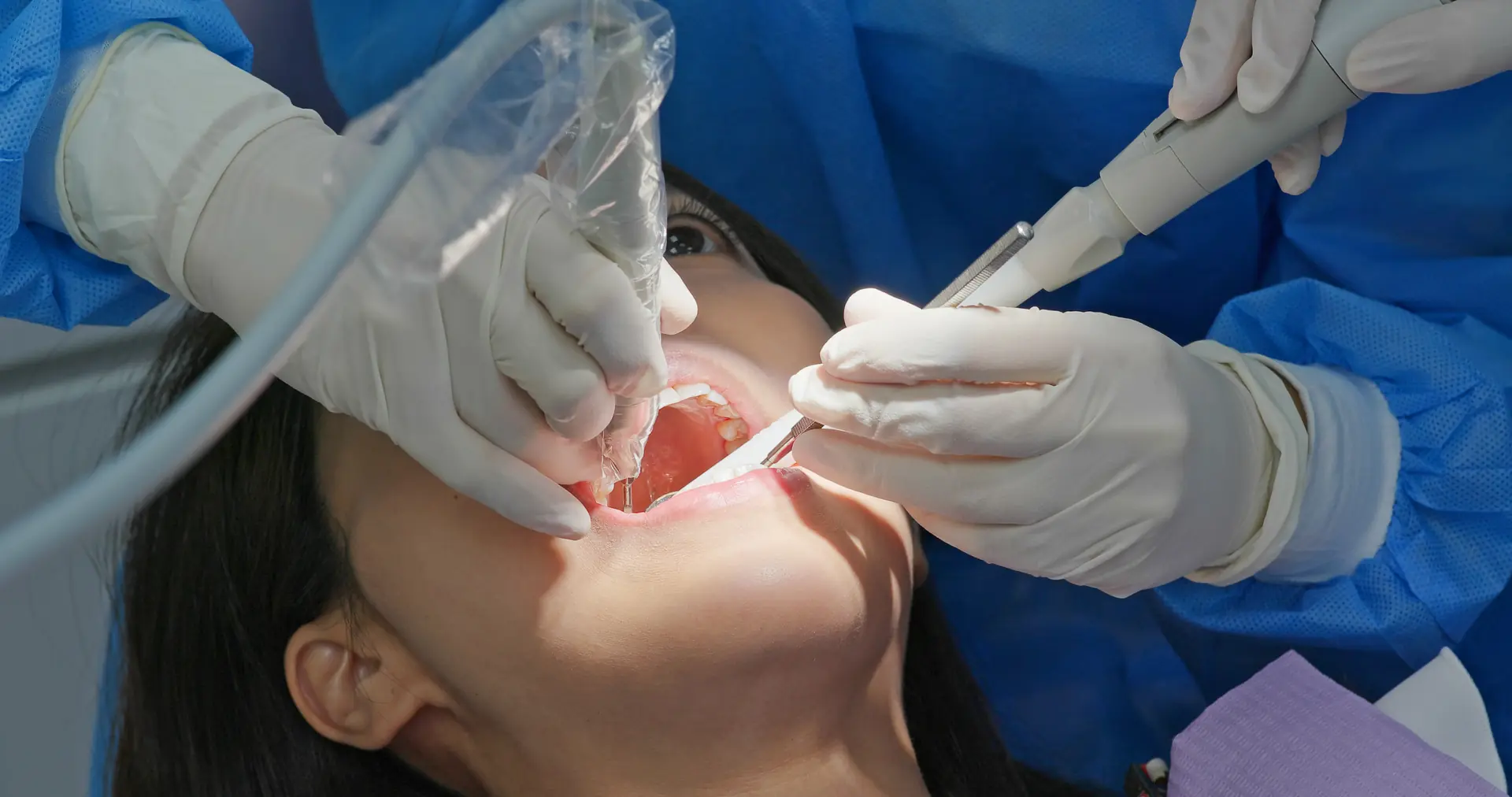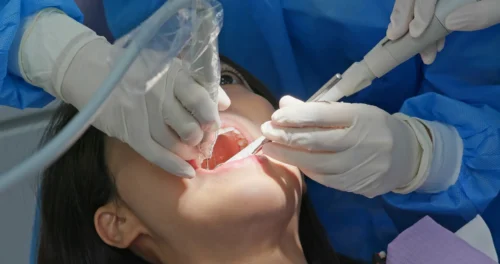
ROOT CANALS
Root Canals in Pleasant View & North Ogden, Utah
Stop the Pain. Save Your Tooth. Smile Again.
There’s nothing quite like the deep, throbbing pain of a severely infected tooth. If you’ve been dealing with persistent toothache, sudden sensitivity to hot or cold, or swelling around your gums, a root canal might be the treatment you need. At our Pleasant View and North Ogden dental offices, we provide comfortable, effective root canal therapy that’s designed to eliminate pain, not cause more of it.
Let’s walk you through everything you need to know about root canals—why they’re necessary, what the process involves, and why you don’t have to dread getting one anymore.
When Is a Root Canal Necessary?
Root canal treatment becomes necessary when the inner part of your tooth—called the pulp—becomes infected or inflamed. The pulp contains nerves, blood vessels, and connective tissue, and when bacteria reach this part of the tooth, things can get painful fast.
This typically happens because of:
- Deep decay that wasn’t treated in time
- A cracked or chipped tooth
- Repeated dental procedures on the same tooth
- Trauma from an accident or injury
Once the pulp is compromised, the infection can spread. If left untreated, it can lead to abscesses, bone loss around the root, or even cause the entire tooth to die. That’s when people start considering extractions—but root canals can save the tooth and prevent more invasive procedures down the road.
What Exactly Is a Root Canal?
What Exactly Is a Root Canal?
Contrary to popular belief, root canals aren’t as scary as they sound. In fact, this treatment has been saving natural teeth for over a century and is performed over 15 million times a year in the U.S. alone. Thanks to advancements in dental technology and sedation options, root canals are now as routine and comfortable as getting a filling.
Inside every tooth is a hollow area filled with soft tissue—the pulp—which helps your tooth grow during development. While the pulp is vital when you’re young, your tooth can survive just fine without it once it’s fully matured. That’s why we’re able to remove it when it becomes infected and still preserve the tooth structure.
The root canal procedure involves carefully removing the damaged pulp, cleaning and disinfecting the inside of the tooth, and then sealing it to prevent future infection.

Signs You Might Need a Root Canal
Pain is usually the most obvious sign. But not all toothaches mean you need a root canal. Here are some key indicators that the inner pulp may be infected:
- Severe tooth pain, especially when chewing or applying pressure
- Prolonged sensitivity to hot or cold, even after the source is removed
- Swelling or tenderness in the gums near the affected tooth
- A recurring pimple or bump on the gum (which may indicate an abscess)
- Darkening or discoloration of the tooth
If you’re experiencing any of these symptoms, don’t wait—give our office in Pleasant View or North Ogden a call. The sooner we take a look, the sooner you can get relief.

Why Choose Us for Your Root Canals?
We’ve helped countless patients in Pleasant View and North Ogden get out of pain and get back to life with gentle, compassionate care. We combine advanced dental technology with a calming environment and a team that genuinely cares about your comfort.
Our philosophy is simple: treat every patient the way we’d want our own family treated. That means clear communication, honest recommendations, and a steady hand during every procedure.
Plus, if you’ve been putting off your root canal due to fear or anxiety, we’ll walk you through everything and offer sedation options that take the edge off—so you can finally get the relief you deserve.
What to Expect During Your Root Canal Treatment
When you come in with pain, our first priority is to get you out of it.
After a thorough exam and digital imaging to confirm the diagnosis, we’ll discuss your options. If a root canal is necessary, we’ll schedule your treatment and make sure you’re fully comfortable every step of the way.
Here’s what the process generally looks like:

Local Anesthesia
We numb the area completely so you don’t feel a thing. If you’re anxious or nervous, we also offer sedation options to help you relax.

Access and Removal
A small opening is made in the tooth to access the infected pulp. It’s then gently removed.

Cleaning and Sealing
The inside of the tooth is cleaned, disinfected, and shaped. Then it’s sealed with a rubber-like material to protect the root canal.

Temporary Protection
A temporary crown or filling is placed to protect the tooth while your permanent crown is being made.
The entire procedure typically takes one to two visits, depending on the complexity of the case. Best of all, the relief is almost immediate.
What Happens After Root Canals?
After your root canal is finished, your tooth will need a permanent crown. This crown restores the shape, strength, and function of your tooth so you can chew normally without worrying about reinfection or damage.
At your first visit, we’ll take impressions for your custom crown and place a temporary crown to protect the tooth. A few weeks later, you’ll return for the permanent crown placement.
Most patients are surprised by how smooth and painless the process is. In fact, many people go back to work the same day and resume normal activities right after the appointment.
Will It Hurt?
That’s the #1 question we get—and we totally get it. Root canals have a bad reputation, but the truth is that the pain you feel is from the infection, not the procedure.
Once you’re numb, you won’t feel anything during the treatment itself. You might have a bit of tenderness for a day or two afterward, but this is easily managed with over-the-counter medication and usually clears up quickly.
In fact, most patients say the pain relief they feel afterward is well worth the short visit to our office.
Ready to Stop the Pain?
If you’re in or around Pleasant View or North Ogden and dealing with persistent tooth pain, don’t wait. The longer you delay treatment, the worse the infection can get—and the more complicated (and expensive) the fix becomes.
Let us help you save your tooth and smile confidently again.
Call today to schedule your consultation. Relief is just one appointment away.
Elevate your dental experience!
Root Canal FAQs
-
What is a root canal, and why might I need one?
A root canal is a dental procedure designed to save a tooth that’s severely infected or damaged. It involves removing infected pulp tissue from inside the tooth, disinfecting and sealing it, and then restoring the tooth with a crown or filling. You might need a root canal if you experience persistent toothache, sensitivity to heat or cold, gum swelling, or tooth discoloration. Learn More -
Does a root canal procedure hurt?
Modern root canal procedures are usually painless thanks to local anesthesia and advanced dental techniques. Most patients report the experience is similar to getting a regular dental filling. Mild discomfort or soreness afterward is normal, but it typically resolves quickly with over-the-counter pain medications. Learn More -
How long does a root canal treatment last?
A properly performed root canal can last a lifetime. Success rates are extremely high—around 90% to 95%—especially when combined with good oral hygiene and regular dental checkups. Ensuring a durable restoration, such as a crown, can further extend the life of your treated tooth. Learn More -
What happens if I don’t get a root canal when it’s needed?
Avoiding or delaying a root canal can lead to severe complications. The infection may spread, causing abscess formation, jawbone deterioration, tooth loss, or even systemic infection. Prompt treatment not only preserves your tooth but protects your overall health. Learn More -
How much does a root canal cost, and does insurance cover it?
The cost of a root canal typically ranges from $600 to $1,500, depending on the tooth location and severity of the damage. Molars usually cost more due to complexity. Most dental insurance plans partially cover root canals, significantly reducing out-of-pocket expenses. Always verify coverage with your insurance provider beforehand. Learn More
